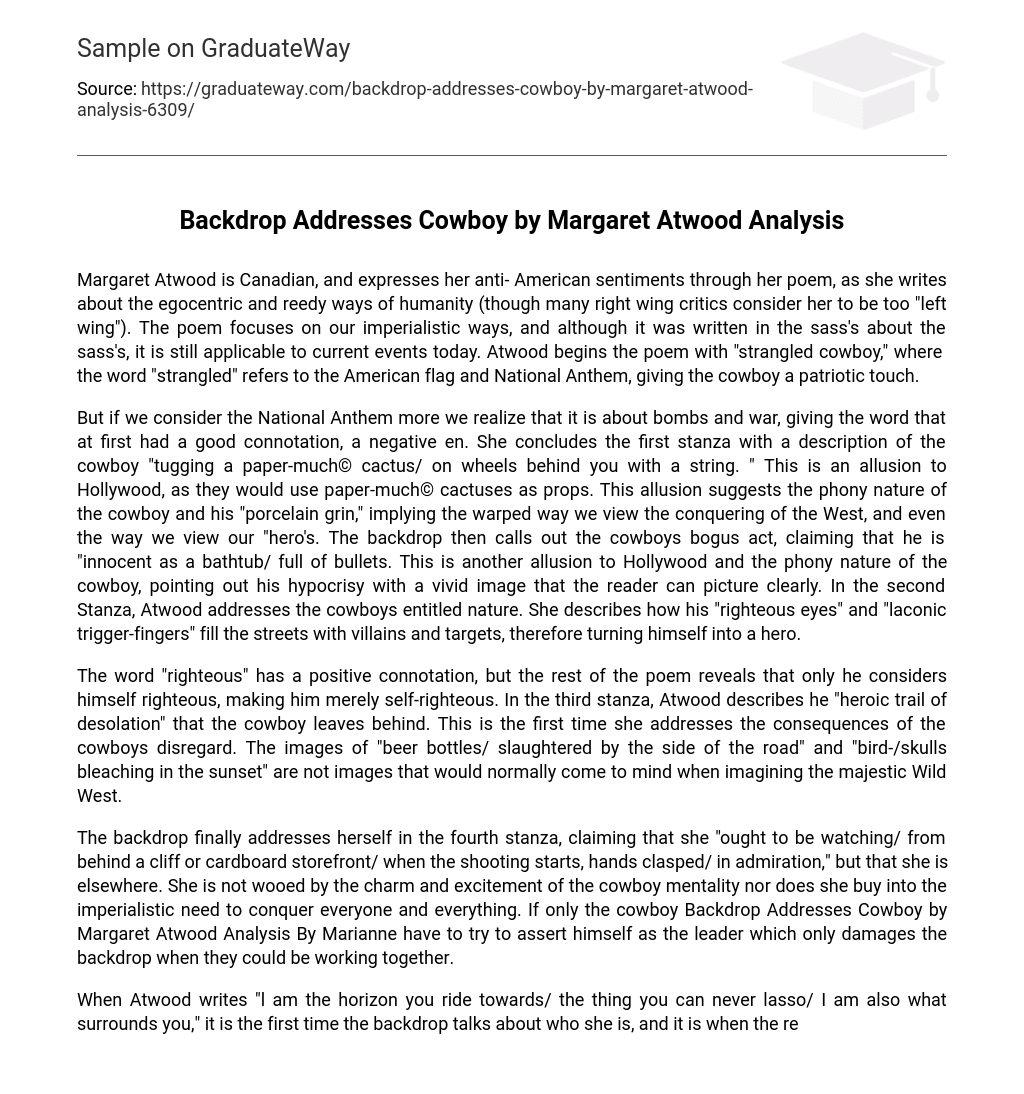Margaret Atwood is Canadian, and expresses her anti- American sentiments through her poem, as she writes about the egocentric and reedy ways of humanity (though many right wing critics consider her to be too “left wing”). The poem focuses on our imperialistic ways, and although it was written in the sass’s about the sass’s, it is still applicable to current events today. Atwood begins the poem with “strangled cowboy,” where the word “strangled” refers to the American flag and National Anthem, giving the cowboy a patriotic touch.
But if we consider the National Anthem more we realize that it is about bombs and war, giving the word that at first had a good connotation, a negative en. She concludes the first stanza with a description of the cowboy “tugging a paper-much© cactus/ on wheels behind you with a string. ” This is an allusion to Hollywood, as they would use paper-much© cactuses as props. This allusion suggests the phony nature of the cowboy and his “porcelain grin,” implying the warped way we view the conquering of the West, and even the way we view our “hero’s. The backdrop then calls out the cowboys bogus act, claiming that he is “innocent as a bathtub/ full of bullets. This is another allusion to Hollywood and the phony nature of the cowboy, pointing out his hypocrisy with a vivid image that the reader can picture clearly. In the second Stanza, Atwood addresses the cowboys entitled nature. She describes how his “righteous eyes” and “laconic trigger-fingers” fill the streets with villains and targets, therefore turning himself into a hero.
The word “righteous” has a positive connotation, but the rest of the poem reveals that only he considers himself righteous, making him merely self-righteous. In the third stanza, Atwood describes he “heroic trail of desolation” that the cowboy leaves behind. This is the first time she addresses the consequences of the cowboys disregard. The images of “beer bottles/ slaughtered by the side of the road” and “bird-/skulls bleaching in the sunset” are not images that would normally come to mind when imagining the majestic Wild West.
The backdrop finally addresses herself in the fourth stanza, claiming that she “ought to be watching/ from behind a cliff or cardboard storefront/ when the shooting starts, hands clasped/ in admiration,” but that she is elsewhere. She is not wooed by the charm and excitement of the cowboy mentality nor does she buy into the imperialistic need to conquer everyone and everything. If only the cowboy Backdrop Addresses Cowboy by Margaret Atwood Analysis By Marianne have to try to assert himself as the leader which only damages the backdrop when they could be working together.
When Atwood writes “l am the horizon you ride towards/ the thing you can never lasso/ I am also what surrounds you,” it is the first time the backdrop talks about who she is, and it is when the reader realizes that she s the land and environment of the West. The image of “tannins, bones, empty shells” illustrates the way the byproducts of the cowboy fill her “brain,” and although she does not mention this, we all know what litter does to a natural environment – it destroys it.
By the final stanza, it is clear that the cowboy represents greed, entitlement, imperialism, and America, while the backdrop represents the natural, original, beautiful aspects of America that the cowboy is knowingly destroying. The cowboy is too concerned with “getting and spending” to appreciate the beauty and importance f the backdrop, and loses sight of what’s important, as William Wordsmith discusses in his poem “The World Is Too Much With Us. The poem ends with the lines “l am the space you desecrate/ as you pass through,” suggesting that the cowboy is using her for abusive and selfish purposes as he merely passes through. The poem ends with a powerful reminder that our actions have consequences that extend past the scope of what we might understand, and that we must be aware that what may appear to be great gains in one sense might also be great losses in another.





